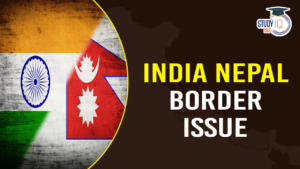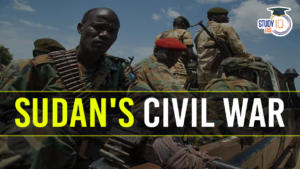Table of Contents
Context: The African Union criticised the Israeli military’s actions in Rafah, southern Gaza, and urged the international community to intervene to halt the “deadly escalation” of the conflict.
African Union
The African Union (AU) is a continental association that encourages cooperation and unification among all African nations. The AU, which promotes intercontinental cooperation and the socioeconomic growth of Africa, now has 55 members. The Organization of African Unity (OAU) was replaced by the African Union, which has its headquarters in Addis Abeba, Ethiopia.
1.3 billion people are living in the 11 million square metre region covered by the African Union. The African Union Assembly decides on its policies. It is a continental organisation that aims to promote unity, solidarity, and cooperation among African states.
○ The AU also plays a role in mediating conflicts and deploying peacekeeping troops in Africa.
| About African Union | Details |
| Formed | On 9th July 2002 to replace the Organization of African Unity (OAU). |
| Objective | It seeks to promote political and economic integration, peace and security, democratic governance, and social development across the continent. |
| Headquarter | Addis Ababa, Ethiopia. |
Read about: International Organizations and their Headquarters
African Union Timeline for Evolution
| Year | Detail |
| 1963 | The Organization of African Unity (OAU) is established. |
| 1980 | The Lagos Plan of Action was adopted by the Organization of African Unity. |
| 1999 | In the Sirte Extraordinary Session it was decided to establish an African Union. |
| 2000 | In the Lome Summit, Constitutive Act of the Union was adopted. |
| 2001 | The Lusaka Summit drew the road map for the implementation of the AU. |
| 2002 | In the Durban Summit, African Union was launched and convened the 1st Assembly of the Heads of States of the African Union. |
| 2003 | The AU establishes the African Peace and Security Council. |
| 2007 | The AU launches the African Standby Force. |
| 2011 | The AU intervenes in Libya to protect civilians from Muammar Gaddafi’s forces. |
| 2013 | The AU launches the African Force in Somalia (AMISOM) to combat al-Shabab. |
| 2016 |
The AU establishes the African Continental Free Trade Area (AfCFTA). |
African Union New Member of G20
Here, on Saturday, September 9, 2023, the African Union became recognised as an official member of the G-20. Prime Minister Narendra Modi welcomed Azaly Assoumani, the chair of the African Union, to the G-20 leaders’ table and declared that the addition of the African bloc would increase the G-20’s efficacy. The African Union is the second regional power to join the G20 after the EU.
“PM Of India stated that he is honoured to welcome the African Union as a permanent member of the G-20. This will strengthen the G-20 and also strengthen the voice of the Global South. AU’s inclusion in G-20 was welcomed by Abdulla Shahid, Foreign Minister of Maldives who said, “This will surely enhance the representation, and voice of developing countries, in the deliberations and decisions of the Group.”
Africa asked the G-20 member nations to engage in the industrialization of the continent and produce commodities using the resources of Africa in order to address the issues that the region is now facing. “Africa has a responsibility to create employment security on the continent so that our youth will stay here and find the jobs they need. But we also need to collaborate with Europe, and Europe will need to support our efforts to train our workforce.
African Union History
The Sirte Declaration, which demanded the creation of the African Union Commission, was released on September 9, 1999, in Sirte, Libya, thus establishing the African Union. The bloc was established on May 26, 2001, in Addis Ababa, Ethiopia, and officially introduced on July 9, 2002, in Durban, South Africa.
The Organisation of African Unity (OAU), which was established on May 25, 1963, in Addis Ababa, Ethiopia, and disbanded on July 9, 2002, was replaced by the African Union (AU). The African Union Assembly, a semi-annual gathering of the continent’s heads of government, makes the majority of the key decisions for the African Union.
African Union Formation
The independent African governments created the Organisation of African Unity in 1963. The group aims to encourage collaboration among African nations. The Organisation of African Unity ratified the Lagos Plan of Action in 1980. According to the strategy, Africa should encourage intra-African commerce in order to reduce its reliance on the West. The Organisation of African Unity was replaced by the African Union in 2002, which included accelerating the “economic integration of the continent” as one of its objectives.
African Union Member Countries
The African Union is made up of 55 different nations. Currently suspended are a few of the member states. The following is a list of every member of the African Union:
| African Union Countries | ||
| Liberia | Burkina Faso (suspended) | Morocco |
| Chad | Algeria | Egypt |
| Ghana | Rwanda | Djibouti |
| South Sudan | Nigeria | Central African Republic |
| Tanzania | Kenya | Zambia |
| Somalia | Leone | Sierra |
| Eswatini | Eritrea | Gabon |
| Gabon | Senegal | Mozambique |
| Tunisia | South Africa | Benin |
| Togo | Mali (suspended) | Namibia |
| Burundi | Zimbabwe | Guinea (suspended) |
| Botswana | Cameroon | Malawi |
| Libya | Mauritius | Guinea-Bissau |
| Cape Verde | Ivory Coast | Democratic Republic of the Congo |
| Ethiopia | Lesotho | Mauritania |
| Comoros | Angola | Seychelles |
| Sahrawi Arab Democratic Republic | Republic of the Congo | Niger |
| Gambia | Madagascar | Equatorial Guinea |
| São Tomé and Príncipe | Uganda | Sudan |
African Union Vision
The Organisation of African Unity (OAU) was re-launched as the African Union to actualize Africa’s potential in the battle against colonialism, with a major emphasis on greater integration and collaboration among African states for economic development. The AU is motivated by its citizens and guided by its vision of a peaceful, prosperous, and integrated Africa as a driving force in the world economy.
African Union Objectives
Addis Abeba serves as the home of the African Union Commission, the organization’s secretariat. The largest city in the AU is Lagos, Nigeria, whereas the biggest urban agglomeration is Cairo, Egypt. The African Union is home to about 1.3 billion people and spans an area of about 29 million km2, including well-known global landmarks like the Sahara and the Nile. The African Union’s goals include:
- To foster stronger cohesion, solidarity, and togetherness among African countries and nations.
- To safeguard the independence, territorial integrity, and sovereignty of its member states.
- To expedite the political and social unity of the continent.
- To promote and uphold African solidarity in matters affecting the nation and its citizens.
- Promote international collaboration while keeping in mind the Universal Declaration of Human Rights and the United Nations Charter.
- To establish stability, security, and peace.
- To advance democratic institutions, public participation, and good governance
- Under other applicable human rights treaties as well as the African Charter on Human and Peoples’ Rights, to promote and protect human and peoples’ rights.
- To create the conditions necessary for Africa to occupy its rightful position in the global economy and in international negotiations.
- To promote cultural, social, and economic diversity as well as the integration of African economies.
African Union Structure
The work of the African Union is implemented through several principal decision-making organs:-
- The Assembly of Heads of State and Government
- The Executive Council,
- The Permanent Representatives Committee (PRC)
- Specialized Technical Committees (STCs)
- The Peace and Security Council and the African Union Commission.
- The AU structure promotes the participation of African citizens and civil society through the Pan-African Parliament and the Economic, Social & Cultural Council (ECOSOCC).
Organs that handle judicial and legal matters, as well as human rights issues, include:-
- African Commission on Human and Peoples’ Rights (ACHPR)
- African Court on Human and Peoples’ Rights (AfCHPR)
- AU Commission on International Law (AUCIL)
- AU Advisory Board on Corruption (AUABC) and
- The African Committee of Experts on the Rights and Welfare of the Child.
The African Union is also trying to create three financial organisations for the continent: the African Monetary Fund, the African Investment Bank, and the African Central Bank. Other significant organisations that make up the African Union’s framework are the Regional Economic Communities (RECs) and the African Peer Review Mechanism.
African Union Assembly
The highest decision-making body within the African Union is the Assembly, which is comprised of all heads of state and government from member nations. The Assembly is presided over by the president of the Democratic Republic of the Congo, Félix Tshisekedi. Another representative body of the organisation is the Pan-African Parliament, which has 265 members who are chosen by the national legislatures of AU member states. The head of the company is Roger Nkodo Dang. The other political institutions of the African Union include:
- The Executive Council, which formulates decisions for the Assembly and is composed of foreign ministers;
- The Permanent Representatives Committee, which is composed of ambassadors to Addis Abeba from AU member states;
- Financial Council
The African Union Commission, which functions as a secretariat for political bodies, is presided over by South African Nkosazana Dlamini-Zuma. On July 15, 2012, Dlamini-Zuma won the highly contested election to lead the African Union Commission, defeating Jean Ping of Gabon. She was the organization’s first female head. The executive/administrative branch of the AU, sometimes known as the secretariat, is the African Union Commission. It is made up of numerous Commissioners who are in charge of several policy areas.
Achievements of African Union
- Peace and security: The African Union Peace and Security Council has mediated conflicts in Sudan, Libya, and South Sudan, facilitated peaceful transitions in Burkina Faso and Sudan, and deployed peacekeeping troops to Somalia and Mali.
- The AU also coordinated with UN missions such as the African Union-United Nations Mission in Darfur (UNAMID), the African Union-United Nations Hybrid Operation in Mali (MINUSMA).
| Fact |
| Article 4(h) of the Constitutive Act of the African Union (AU) mentions the AU’s right to intervene militarily in its member states in circumstances of war crimes, genocide, and crimes against humanity. |
- Economic development: It established the African Continental Free Trade Area (AfCFTA) (which came into force on May 30, 2019) to create a single market for goods and services across Africa.
- The AU also has other initiatives to promote trade and investment, such as the Programme for Infrastructure Development in Africa (PIDA).
- Democracy and good governance: The African Union (AU) is committed to promoting democracy and good governance in Africa.
- For example: It has the African Charter on Democracy, Elections and Governance and the African Peer Review Mechanism (APRM) to help African countries improve their governance.
- Human rights: The African Union (AU) is committed to promoting human rights in Africa.
- For example: the African Charter on Human and Peoples’ Rights and the African Commission on Human and Peoples’ Rights to investigate and report on human rights violations.
- Diplomatic Achievement: The AU’s establishment of a permanent mission in Beijing, China reinforces Africa’s global standing and enables it to speak with a united voice on world affairs.
- Women’s Economic Financial Inclusion: The Decade of Women’s Financial and Economic Inclusion initiative to promote gender equality and women’s empowerment in Africa.
African Union Challenges
Unconstitutional Hold on Power
In Africa, military coups and the use of extralegal tactics to maintain power have seen a disturbing comeback. Since 2013, there have been at least 32 coups and coup attempts. Since 2020, five of the seven coup attempts have been successful. Pro-democracy demonstrators in the five countries — Burkina Faso, Chad, Guinea, Mali, and Sudan — were mercilessly put down by the coup leaders. For instance, nearly 100 people have died as a result of the suppression of anti-coup rallies in Sudan. Food insecurity threatens more than 18 million people in Sudan.
Disregard for the Rule of Law
Governments that were legitimately and democratically elected are increasingly taking action against civil society organisations. The institutions that should keep the governments accountable are being eliminated by the governments, and the media is being silenced. They detain activists and pass legislation restricting civil society organisations’ operations.
UNSC
Africa has not yet received at least two permanent seats on the United Nations Security Council. Africa is the subject of more than two-thirds of the council’s agenda, although the continent lacks permanent representation.
India and African Union
- Economic Cooperation: India’s trade with Africa has grown from US$ 68.5 billion in 2011-12 to US$ 90.5 billion in 2022-23 and Indian investors have also expanded their footprint in Africa.
- ○ India is now one of the top five investors in Africa with cumulative investments worth US$ 73.9 billion between 1996 to 2022.
- Key programs and partnerships
- ○ Pan-African e-Network Project
- ○ Team-9 Initiative
- ○ India-Africa Forum Summit
- ○ India-Africa Trade Council
- ○ India-Africa Health Sciences Platform
- ○ India-Africa Institute of Agriculture and Rural Development
- India has actively promoted Africa’s involvement in global initiatives like:
- ○ International Solar Alliance
- ○ Coalition for Disaster Resilient Infrastructure
- ○ Nalanda University
Recent Developments
- India announced the Phase-II upgrade of the Entrepreneurship Development and Technology Centre (CEDT) in Dakar, built with Indian grant assistance.
- India also offered a Special ITEC English proficiency course for Senegalese public servants.
- India announced a Special training programme for a batch of 15 Senegalese diplomats at the Sushma Swaraj Institute of Foreign Services.
- Both sides signed three MOUs:
- ○ MoU on cooperation in Youth Affairs
- ○ Cultural Exchange Programme (CEP)
- ○ Visa waiver Agreement for diplomats/officials
| Agenda 2063 |
Agenda 2063 is based on seven aspirations:
|
African Union UPSC
The 55 member states that make up the African Union work to strengthen the continent’s unity and solidarity. On September 9, 1999, the union was created to take the role of the Organization of African Unity. The African Union is made up of 55 member states, which are all from Africa. There are five distinct geographic zones. The decisions made by the African Union Assembly are subject to the input and representation of all members of the organisation.


 SQUAD Grouping of USA, Background, Key M...
SQUAD Grouping of USA, Background, Key M...
 India Nepal Border Issue, Background, Re...
India Nepal Border Issue, Background, Re...
 Sudan's Civil War, Historical Context, R...
Sudan's Civil War, Historical Context, R...

















